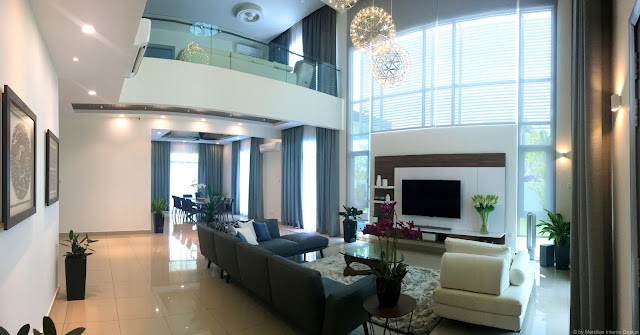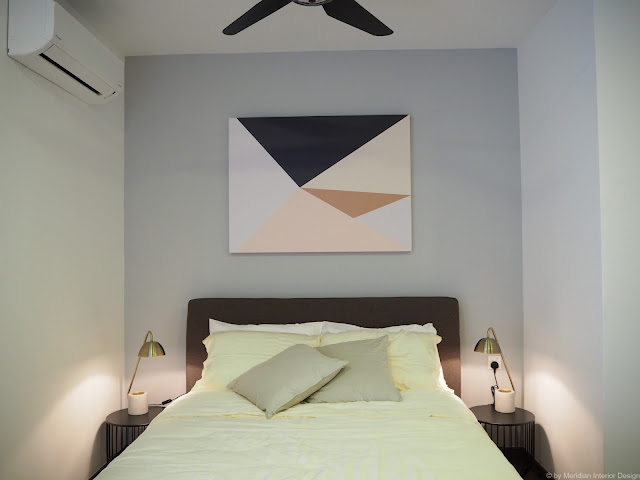How Your Interior Design Is Influencing The Subconcious Mind
3:13 PMHow Your Home Interior Can Affect Your Mood
 |
| Semi-D project by Meridian Interior Design, Kuala Lumpur. Click here to contact us. |
Usually, when we discuss interior design, we talk about the aesthetic aspects – how to achieve a specific look, which decorating style you should emulate, new design trends that you should check out. That’s only one piece of the puzzle.
An area that’s not always taken into consideration is the philological effect of interior design on your subconscious. Believe it or not, the choices that you make when deciding how your home will look have a documented effect on your emotions and perceptions. The color of the walls in your kitchen might be contributing to your anxiety and your brand of couch could lead others to assume that you’re standoffish.
Want to make sure that your home is giving off the right impression? Read on for more information about the psychological side of décor. Use this information to create a design that works for you – inside and out.
 |
| Semi-D project by Meridian Interior Design, Kuala Lumpur. Click here to contact us. |
Color Choice Affects Your Mood
It’s no surprise that color is a main component of how we experience the world around us. But, what may be surprising to some is the fact that that the colors in our environment have a definitive effect on or moods and emotions. As you begin to conceptualize your home’s interior design, make sure that you are using colors in ways that fit with the tone you want to create in the space.
Modern color psychology dates its origins to the early 19th-century when Johann Wolfgang von Goethe published his book, Theory of Colors. Though there is some debate regarding the implications of certain shades, researchers, interior designers and marketing professionals seem to agree on these basic tenets:
Red: Symbolizes power and passion. It can be used to warm up spaces and make them feel more intimate.
Orange: Offers a jolt of energy and innovation. It’s best used as an accent because too much can leave people feeling overwhelmed.
Yellow: Associated with happiness, creation, and creativity. It works well in combination with a calming neutral and in rooms with lots of natural light to create a peaceful environment.
Green: Known for its soothing qualities. Green is the perfect choice for a foyer or entryway because it eases the transition from the outdoors.
Blue: Perpetuates feelings of calm and freshness. It’s a good fit for high traffic areas like kitchens and bathrooms.
Purple: Connotes royalty and luxury. Purple is a great choice for formal living rooms or master bedrooms because it adds an air of lush sophistication.
Gray: Gives a sense of relaxation and serenity. Use gray in spaces like home offices or bathrooms.
Brown: Like green, brown’s natural roots give it a relaxing touch. Choose it for rooms where the family gathers and furniture groupings that will incite conversation.
Black: An assertion of power. Use black for statement pieces that you want to draw the eye.
White: Relates a sense of cleanliness and purity. It is great for defining a space, but use white in conjunction with other colors since too much reads as sterile.
Remember, when you choose which colors to include in your interior, three picks are better than one. Choose a neutral for the largest items like walls and flooring, a calmer color for furniture and other sturdy items. Then, pick a third more dramatic color to pop in your statement accessories and décor.
 |
| Semi-D bedroom design by Meridian Interior Design, Kuala Lumpur. Click here to contact us. |
Your Possessions Reveal Your Personality
Once you put color on the walls, it’s time to decide how to fill the space. In his book, The System of Objects, sociologist Jean Baudrillard argues that every object chosen to fill a space helps to inform its function. But, beyond that, the combination of every item that fills an interior – from the seating arrangements, to the wall hangings, and down to the coasters that sit on your coffee table – act as an expression of our personalities and desires.
He suggests when we invite guests into our homes, they instinctively evaluate our interiors on four distinct value criteria, in addition to how the rooms look at face value:
Function: Will this item fit your needs? Is the kitchen table big enough to seat your whole family? Will this flooring cover the entire area of the room?
Exchange: Is this item worth the price? Would you rather have this singular high-end couch for RM10,000 or a whole bedroom suite for the same price?
Symbolic: Does this item have an emotional attachment? Did you choose a collection of family photos for your décor or a print of a painting?
Sign: Does this item have a particular or status symbol? Is it a name brand or a generic?
Using these criteria, a person who chooses a smaller, designer couch over one that is a generic brand that offers plenty of room for their family to spread out together will be considered as very concerned with appearance and social status. Conversely, a person whose refrigerator door is covered in kids’ artwork and postcards from friends’ trips will be seen as more welcoming and sentimental than someone with a minimalist kitchen.
While there are no wrong answers, take Baudrillard’s work into account as you go shopping for items to fill your rooms. Make sure that your interiors are giving off the impression you want.
 |
| Signature Kitchen design by Meridian Interior Design, Kuala Lumpur. Click here to contact us. |
Perception of Space Helps Give The Illusion of More
You know the saying, “Dress for the job you want, not the job you have”? While that’s pretty solid advice for acing an interview, don’t stop there. The sentiment can just as easily be applied to decorating the rooms in your home.
Interior designers use a concept called Perception of Space for decades to make home’s appear more spacious and to make sure that rooms are as user-friendly as possible. Essentially, it just means using visual tricks to alter how others view the space around them.
If you want a room in your home to appear larger, choose furniture that is scaled to size and slimmer, place a large mirror on the back wall, and create depth with wall hangings. People who want their space to feel inviting should stick to a warm color pallet, create intimate groupings with furniture, and offer plenty of ambient lighting.
 |
| Signature Kitchen design by Meridian Interior Design, Kuala Lumpur. Click here to contact us. |
The way that the interior design in your home looks is only one small facet of its impact. Behind the colors that you choose for your walls and the way that you arrange your furniture, there is an additional layer of meaning. Every design choice that you make has a distinct psychological impact on your subconscious. Read these tips above and take them into account as you conceptualize your space. Let us help you create a space that’s equally pleasing to your body and mind.
Would you consider decorating your home from a psychological point of view? If you’ve already done so, what design choices did you make?
original article credited to https://freshome.com/2014/09/09/how-your-interior-design-is-influencing-your-subconscious/
















0 comments